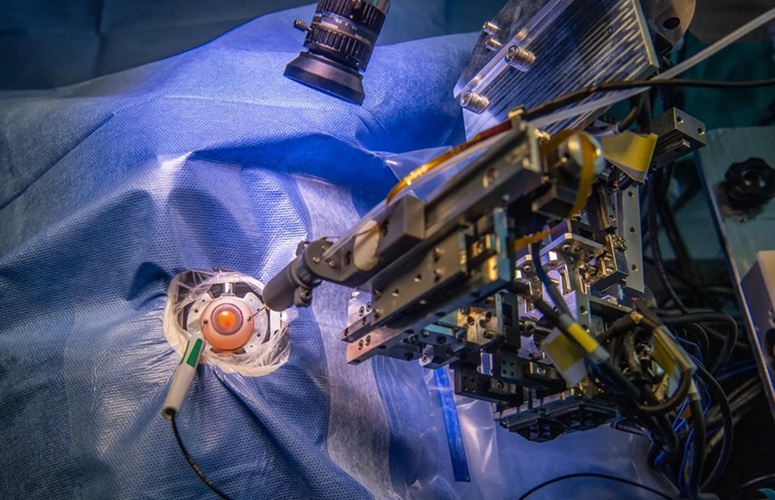Fujifilm’s AI Platform, REiLI Chosen by ASST Vimercate Hospital to Support Operators in Fight Against COVID-19
|
By HospiMedica International staff writers Posted on 03 Jul 2020 |

Image: Fujifilm’s AI Platform, REiLI Chosen by ASST Vimercate Hospital to Support Operators in Fight against COVID-19 (Photo courtesy of Fujifilm Medical Systems)
Amidst the COVID-19 emergency, ASST Vimercate Hospital (Vimercate MB, Italy) has chosen and implemented Fujifilm Medical Systems’ (Tokyo, Japan) Artificial Intelligence (AI) platform, REiLI.
REiLI’s processing of CT scans and chest X-rays provides important support for radiologists, offering them an extremely rapid, quantitative and objective assessment of the various zones of the lungs. The chest X-ray, in particular, is the best example of applying the new AI technology, in that it is a quick and simple examination which provides a large amount of useful information for evaluating the presence of the pulmonary parenchymal consolidation caused by the virus. The data obtained from AI does not replace either the molecular diagnoses performed using the nasopharyngeal swab (RT-PCR) or the precious analyses and diagnoses performed by radiologists. The data, however, does provide support in reporting on daily examinations conducted to monitor and study the development of the disease, and constitute a second opinion for the operators. REiLI, Fujifilm’s AI platform, is integrated with the Lunit Insight CXR module for the analysis and detection of the main types of pulmonary disease (nodules, atelectasis, fibrosis, calcifications, cardiomegaly, etc.). In fact, the Lunit Insight CXR3 module has been updated to provide support in specifically identifying the pulmonary parenchymal consolidation caused by the virus.
During the novel coronavirus emergency, operations and workflows in all Italian hospitals were disrupted, which significantly increased workloads. As a consolidated partner of ASST Vimercate, Fujifilm wanted to ensure that its cutting-edge tools were available to reduce the impact caused by the rapid spread of COVID-19 and to deliver a timely response to the spread of the pandemic. In November 2019, ASST Vimercate and Fujifilm signed an agreement to explore new approaches for the treatment of patients, with benefits both the clinical services and healthcare operators. REiLI was installed at ASST Vimercate in just two weeks, by installing a parallel PACS to avoid interrupting the daily workflow. On March 30, REiLI was already operational and had worked on more than 600 images during its first five days. During the emergency, more than 900 positive cases of COVID-19 were found, with an average of 80 chest X-rays per day, allowing for precise and punctual data collection.
“REiLI's support has allowed our radiologists to report examinations with greater speed and efficiency,” said Marcello Intotero, Head of Radiology Structure and Diagnostic Services Department, ASST Vimercate. “In numerical terms, their workloads have not particularly increased, as other causes for non-urgent examinations were limited to avoid an excess flow of patients. This new technology has given great support to the workflow; all images that AI identified as suspected COVID-19 were subjected to processing by the radiologist in a faster and more urgent manner than other images which, instead, the system analyzed as corresponding to a healthy lung.”
“During the health emergency, more than 80 chest X-rays of inpatients and first-aid patients have been analysed each day at the Vimercate Hospital,” said Giovanni Delgrossi, Head of IT Department, ASST Vimercate. “If no priority is set for the examinations to be reported, it may take hours to identify a particular X-ray which could require prompt, immediate action from doctors. In an emergency like the current one, we need to react and act even more quickly.”
“Alternative Intelligence is a new operating concept projected towards collaborative intelligence between machine and man,” said Nicola Bilibio, Clinical Specialist Medical Informatics (CSE) Fujifilm Europe GmbH. “This is a fundamental tool for optimizing the workflow and for screening patients from COVID-19. During the emergency, we promptly made our most advanced technologies available to make our concrete contribution to the crisis.”
REiLI’s processing of CT scans and chest X-rays provides important support for radiologists, offering them an extremely rapid, quantitative and objective assessment of the various zones of the lungs. The chest X-ray, in particular, is the best example of applying the new AI technology, in that it is a quick and simple examination which provides a large amount of useful information for evaluating the presence of the pulmonary parenchymal consolidation caused by the virus. The data obtained from AI does not replace either the molecular diagnoses performed using the nasopharyngeal swab (RT-PCR) or the precious analyses and diagnoses performed by radiologists. The data, however, does provide support in reporting on daily examinations conducted to monitor and study the development of the disease, and constitute a second opinion for the operators. REiLI, Fujifilm’s AI platform, is integrated with the Lunit Insight CXR module for the analysis and detection of the main types of pulmonary disease (nodules, atelectasis, fibrosis, calcifications, cardiomegaly, etc.). In fact, the Lunit Insight CXR3 module has been updated to provide support in specifically identifying the pulmonary parenchymal consolidation caused by the virus.
During the novel coronavirus emergency, operations and workflows in all Italian hospitals were disrupted, which significantly increased workloads. As a consolidated partner of ASST Vimercate, Fujifilm wanted to ensure that its cutting-edge tools were available to reduce the impact caused by the rapid spread of COVID-19 and to deliver a timely response to the spread of the pandemic. In November 2019, ASST Vimercate and Fujifilm signed an agreement to explore new approaches for the treatment of patients, with benefits both the clinical services and healthcare operators. REiLI was installed at ASST Vimercate in just two weeks, by installing a parallel PACS to avoid interrupting the daily workflow. On March 30, REiLI was already operational and had worked on more than 600 images during its first five days. During the emergency, more than 900 positive cases of COVID-19 were found, with an average of 80 chest X-rays per day, allowing for precise and punctual data collection.
“REiLI's support has allowed our radiologists to report examinations with greater speed and efficiency,” said Marcello Intotero, Head of Radiology Structure and Diagnostic Services Department, ASST Vimercate. “In numerical terms, their workloads have not particularly increased, as other causes for non-urgent examinations were limited to avoid an excess flow of patients. This new technology has given great support to the workflow; all images that AI identified as suspected COVID-19 were subjected to processing by the radiologist in a faster and more urgent manner than other images which, instead, the system analyzed as corresponding to a healthy lung.”
“During the health emergency, more than 80 chest X-rays of inpatients and first-aid patients have been analysed each day at the Vimercate Hospital,” said Giovanni Delgrossi, Head of IT Department, ASST Vimercate. “If no priority is set for the examinations to be reported, it may take hours to identify a particular X-ray which could require prompt, immediate action from doctors. In an emergency like the current one, we need to react and act even more quickly.”
“Alternative Intelligence is a new operating concept projected towards collaborative intelligence between machine and man,” said Nicola Bilibio, Clinical Specialist Medical Informatics (CSE) Fujifilm Europe GmbH. “This is a fundamental tool for optimizing the workflow and for screening patients from COVID-19. During the emergency, we promptly made our most advanced technologies available to make our concrete contribution to the crisis.”
Latest Critical Care News
- 'Universal' Kidney to Match Any Blood Type
- Light-Based Technology to Measure Brain Blood Flow Could Diagnose Stroke and TBI
- AI Heart Attack Risk Assessment Tool Outperforms Existing Methods
- Smartphone Imaging System Enables Early Oral Cancer Detection
- Swallowable Pill-Sized Bioprinter Treats GI Tract Injuries

- Personalized Brain “Pacemakers” Could Help Patients with Hard-To-Treat Epilepsy
- Microscopic DNA Flower Robots to Enable Precision Medicine Delivery
- Origami Robots to Deliver Medicine Less Invasively and More Effectively
- Improved Cough-Detection Technology Aids Health Monitoring
- AI Identifies Children in ER Likely to Develop Sepsis Within 48 Hours
- New Radiofrequency Therapy Slows Glioblastoma Growth
- Battery-Free Wireless Multi-Sensing Platform Revolutionizes Pressure Injury Detection
- Multimodal AI to Revolutionize Cardiovascular Disease Diagnosis and Treatment
- AI System Reveals Hidden Diagnostic Patterns in Electronic Health Records
- Highly Sensitive On-Skin Sensing Monitor Detects Vitamin B6 and Glucose in Sweat
- Artificial Intelligence Revolutionizing Pediatric Anesthesia Management
Channels
Critical Care
view channel
Light-Based Technology to Measure Brain Blood Flow Could Diagnose Stroke and TBI
Monitoring blood flow in the brain is crucial for diagnosing and treating neurological conditions such as stroke, traumatic brain injury (TBI), and vascular dementia. However, current imaging methods like... Read more
AI Heart Attack Risk Assessment Tool Outperforms Existing Methods
For decades, doctors have relied on standardized scoring systems to assess patients with the most common type of heart attack—non-ST-elevation acute coronary syndrome (NSTE-ACS). The GRACE score, used... Read moreSurgical Techniques
view channel
Robotic Assistant Delivers Ultra-Precision Injections with Rapid Setup Times
Age-related macular degeneration (AMD) is a leading cause of blindness worldwide, affecting nearly 200 million people, a figure expected to rise to 280 million by 2040. Current treatment involves doctors... Read more
Minimally Invasive Endoscopic Surgery Improves Severe Stroke Outcomes
Intracerebral hemorrhage, a type of stroke caused by bleeding deep within the brain, remains one of the most challenging neurological emergencies to treat. Accounting for about 15% of all strokes, it carries... Read morePatient Care
view channel
Revolutionary Automatic IV-Line Flushing Device to Enhance Infusion Care
More than 80% of in-hospital patients receive intravenous (IV) therapy. Every dose of IV medicine delivered in a small volume (<250 mL) infusion bag should be followed by subsequent flushing to ensure... Read more
VR Training Tool Combats Contamination of Portable Medical Equipment
Healthcare-associated infections (HAIs) impact one in every 31 patients, cause nearly 100,000 deaths each year, and cost USD 28.4 billion in direct medical expenses. Notably, up to 75% of these infections... Read more
Portable Biosensor Platform to Reduce Hospital-Acquired Infections
Approximately 4 million patients in the European Union acquire healthcare-associated infections (HAIs) or nosocomial infections each year, with around 37,000 deaths directly resulting from these infections,... Read moreFirst-Of-Its-Kind Portable Germicidal Light Technology Disinfects High-Touch Clinical Surfaces in Seconds
Reducing healthcare-acquired infections (HAIs) remains a pressing issue within global healthcare systems. In the United States alone, 1.7 million patients contract HAIs annually, leading to approximately... Read moreHealth IT
view channel
Printable Molecule-Selective Nanoparticles Enable Mass Production of Wearable Biosensors
The future of medicine is likely to focus on the personalization of healthcare—understanding exactly what an individual requires and delivering the appropriate combination of nutrients, metabolites, and... Read moreBusiness
view channel
Philips and Masimo Partner to Advance Patient Monitoring Measurement Technologies
Royal Philips (Amsterdam, Netherlands) and Masimo (Irvine, California, USA) have renewed their multi-year strategic collaboration, combining Philips’ expertise in patient monitoring with Masimo’s noninvasive... Read more
B. Braun Acquires Digital Microsurgery Company True Digital Surgery
The high-end microsurgery market in neurosurgery, spine, and ENT is undergoing a significant transformation. Traditional analog microscopes are giving way to digital exoscopes, which provide improved visualization,... Read more
CMEF 2025 to Promote Holistic and High-Quality Development of Medical and Health Industry
The 92nd China International Medical Equipment Fair (CMEF 2025) Autumn Exhibition is scheduled to be held from September 26 to 29 at the China Import and Export Fair Complex (Canton Fair Complex) in Guangzhou.... Read more
















